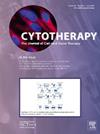Comparison of methotrexate dosing protocols for graft-versus-host disease prophylaxis after unrelated hematopoietic stem cell transplantation
IF 3.7
3区 医学
Q2 BIOTECHNOLOGY & APPLIED MICROBIOLOGY
引用次数: 0
Abstract
Background aims
Methotrexate (MTX) is used as standard graft-versus-host disease (GVHD) prophylaxis in allogeneic hematopoietic stem cell transplantation. However, the optimal dosing regimen among the various MTX regimens available remains unclear.
Methods
We used the registration data of Kyoto Stem Cell Transplantation Group to compare six MTX dosing protocols in a multicenter retrospective analysis of 816 cases of unrelated bone marrow or peripheral blood stem cell transplantation.
Results
Our findings indicated increased risks of grade Ⅱ–Ⅳ acute GVHD and extensive chronic GVHD in the cohort given the shortened mini-dose MTX regimen (5 mg/m2 infusions on days 1, 3, and 6) compared with patients that received any of the other protocols. In addition, transplantation outcomes did not differ significantly between cohorts according to the inclusion or absence of leucovorin rescue.
Conclusion
The original short-term, reduced short-term, and mini-dose MTX methods were all effective for GVHD prophylaxis. However, omission of the day 11 MTX dose from the mini-dose regimen elevated the risks of grade Ⅱ–Ⅳ acute GVHD and extensive chronic GVHD. Moreover, leucovorin rescue might be ineffective in terms of reducing complications.
甲氨蝶呤剂量方案在非相关造血干细胞移植后预防移植物抗宿主病的比较。
背景目的:甲氨蝶呤(MTX)在异基因造血干细胞移植中被用作标准的移植物抗宿主病(GVHD)预防药物。然而,在现有的各种甲氨蝶呤治疗方案中,最佳给药方案仍不清楚。方法:我们使用京都干细胞移植组的注册数据,在816例无关骨髓或外周血干细胞移植的多中心回顾性分析中比较6种MTX给药方案。结果:我们的研究结果表明,与接受任何其他方案的患者相比,缩短小剂量MTX方案(在第1、3和6天输注5mg /m2)的队列患者发生Ⅱ-Ⅳ级急性GVHD和广泛慢性GVHD的风险增加。此外,根据纳入或不纳入亚叶酸素抢救,移植结果在队列之间没有显着差异。结论:原短期、减短期、小剂量MTX方法均可有效预防GVHD。然而,在小剂量方案中遗漏第11天的MTX剂量增加了Ⅱ-Ⅳ级急性GVHD和广泛慢性GVHD的风险。此外,在减少并发症方面,亚叶酸素抢救可能无效。
本文章由计算机程序翻译,如有差异,请以英文原文为准。
求助全文
约1分钟内获得全文
求助全文
来源期刊

Cytotherapy
医学-生物工程与应用微生物
CiteScore
6.30
自引率
4.40%
发文量
683
审稿时长
49 days
期刊介绍:
The journal brings readers the latest developments in the fast moving field of cellular therapy in man. This includes cell therapy for cancer, immune disorders, inherited diseases, tissue repair and regenerative medicine. The journal covers the science, translational development and treatment with variety of cell types including hematopoietic stem cells, immune cells (dendritic cells, NK, cells, T cells, antigen presenting cells) mesenchymal stromal cells, adipose cells, nerve, muscle, vascular and endothelial cells, and induced pluripotential stem cells. We also welcome manuscripts on subcellular derivatives such as exosomes. A specific focus is on translational research that brings cell therapy to the clinic. Cytotherapy publishes original papers, reviews, position papers editorials, commentaries and letters to the editor. We welcome "Protocols in Cytotherapy" bringing standard operating procedure for production specific cell types for clinical use within the reach of the readership.
 求助内容:
求助内容: 应助结果提醒方式:
应助结果提醒方式:


